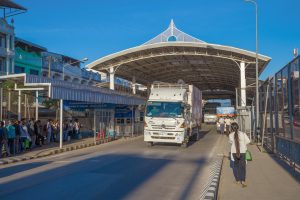Thailand’s resolve to crack down on human traffickers and scam compounds operating along its borders in Myanmar, Cambodia and Laos is meeting stiff resistance from criminal syndicates who have dug in and are harder to catch than well-bred sewer rats.
The focus remains firmly on Myanmar, where Thailand has cut electricity, and blocked oil supplies and Internet connections. But syndicates have countered, buying up alternative electricity from Laos and generators and oil supplies in Thailand that they have smuggled back across the border.
Still, the crackdown has resulted in the rescue of about 7,000 people with the promise of more to come, but that number compares with hundreds of thousands of people believed to have been trafficked in Southeast Asia, according to the United Nations, and forced to work fraudulent online scams under extreme duress.
“China wants all scammers without a Myanmar visa released,” said one source with intimate knowledge of the cross-border Thai crackdown initiated earlier this month.
“That means a lot more than the 10,000 talked about. There are about 100,000 Chinese working in Myawaddy scamming companies out of a total of more than 200,000 scammers in total,” the source said.
The crackdown incorporates the border area around Mae Sot in western Thailand. Myawaddy sits across the Moei River in Myanmar and is about 20 kilometers south of Shwe Kokko, a notorious scamming hub. There are at least 10 scam compounds located to the north and south of Myawaddy.
In Shwe Kokko, sources say there are an estimated 20,000 Chinese speakers who target Chinese victims with “pig-butchering” operations.
China wants them home and to compensate, the syndicates are recruiting Chinese speakers from Kokang in northern Shan State, where locals are Mandarin-speaking ethnic Han Chinese whose ancestors migrated to Burma in the 18th century.
Sources say thousands are voluntarily going to Shwe Kokko or to KK Park near the Moei River as well as to compounds further north.
All are reportedly aligned with the Karen Border Guard Force (BGF), a division of the Myanmar military and/or the Democratic Karen Benevolent Army (DKBA), one of several armed factions that leans towards the military and controls territory inside Karen State.
“I have been told there are about 20,000 in Shwe Kokko alone. So as Chinese are sent out they can be replaced by Chinese-speaking Burmese. They don’t need to live on the compound and are free. Thus, the compounds won’t be shut down,” another source said.
There’s also the awkward question of what to do with those who willingly took jobs with the syndicates simply because the work is lucrative, including hundreds of Caucasian “engineers in Myawaddy. Mostly American. They are volunteers and get well paid.”
Sources said the Caucasians or “white engineers” are coders who develop apps for scamming and while they stepped into the compounds willingly they might not be “released” because they are too highly useful for operations.
One source said about 150 scammers a day were until recently arriving in Myawaddy but these numbers have been curtailed by the crackdown and alternative sites by syndicate bosses, who are evading the authorities, are being sought.
“The big bosses paid rent to the BGF and DKBA and thus won’t be arrested. They can stay in the compounds or with a visa they can go to Yangon for 16,000 Thai Baht (US$476),” one source said.
“Without a passport, it is a lot more expensive,” he added.
The DKBA was responsible for the release and handover of more than 250 people from 20 nationalities last week. A delegation from various embassies in Yangon is expected in Myawaddy for talks with the BGF and DKBA on Sunday.
But as the crackdown continues various sources are saying the criminal syndicates are relocating deeper inside Myanmar – where they are afforded cover by the civil war – or heading back to where it all started during the COVID-19 pandemic, Cambodia.































